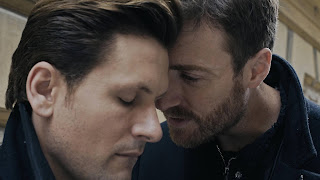Movie Review - Twilight's Kiss (Outfest 2020)
In an interview, Yeung said he read a book about gay men over the age of 60 in Hong Kong who were still in the closet. This film isn't an adaptation of that book, but it certainly inspired Yeung to make this. Yeung admits that gay cinema is rare in Hong Kong, given that it's still in a lot of ways a conservative area. Yeung noticed that most people's perceptions of gay people, as most of the representation of gay people are young and muscular or flamboyant and effeminate. A gay film about two elderly men was rare, not only in Asian cinema but globally as well. A lot of gay films involved relationships where young men connect or hook-up with older men. It's rare that in those films that the older man will be over the age of 60. Some examples where that is the case are Gods and Monsters (1998), Boy Culture (2007) and Beginners (2010). The only films that I can recall that center on two men who are either middle-age or elderly is Ira Sachs' Love Is Strange (2014) and Matthew Ladensack's short film The Apple Tree (2012).
Ben Yuen co-stars as Hoi, a man who is around the same age as Pak. Yet, Hoi actually is retired. He's a former factory worker. Hoi is divorced and lives with his adult son who himself is married and has a little daughter, so Hoi is also a grandfather. Even though Hoi is divorced, he can't be openly gay because he does live with his son who is a very devout Christian and very strict person. It's not clear if his son is homophobic, but that seems to be Hoi's assumption. He can't even talk on the phone without fear that his son will hear his conversations. His son's apartment is small, which is in part why Hoi would like to move out and get his own place.
Hoi probably can't afford his own apartment. His best chance is a retirement home. However, he has a choice to make. He can go to a retirement home that is a regular retirement home that caters to straight people, or he can go to a retirement home that caters to gay people. Hoi has been attending meetings for such men, meetings that are specifically about organizers trying to get a gay retirement home built or up-and-running. The problem is that the organizers need gay men to speak in order to help them raise money and awareness, but most of the gay men who are middle-age and elderly don't want to speak out because of fear of alienating their families, such is the case with Hoi.It's through this issue that Yeung's film explores the culture of homophobia in Hong Kong. However, at a minimum, Yeung's film provides an unlikely look at gay culture there. Other than trolling bathrooms, we're taken inside the bathhouses and saunas where gay men congregate and can partner up freely and openly. It's an interesting portrait of fathers, particularly gay fathers and how traditional roles in fatherhood, after a certain age, can be reversed, especially if the father is living with his adult child. In Hoi's case, the child becomes the parent in a sense and it's a compelling reversal. There's also an undercurrent of religion and how that relates to Hoi and Pak's reticence to be together and even be their true selves.
The thing that is probably the most beautiful is how Yeung depicts the sexuality between these elderly men in a way that is dignified and respectful. Yeung's film doesn't go too far with any graphic nudity or sexuality, but we do see these elderly men lying naked next to each other and being tender and affectionate. Yeung doesn't shy away from showing their bodies, which usually aren't what we see on the covers of magazines, but he shows their bodies with a loving and sensual eye. It's very much appreciated.Suk Suk.
Not Rated but contains nudity and sexual situations.
Running Time: 1 hr. and 32 mins.
Streamed through OutfestNow.
Coming soon via Strand Releasing.














Comments
Post a Comment